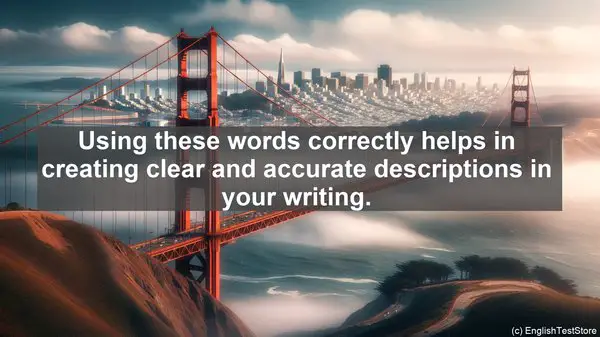Introduction
Comparative literature can be a fascinating subject, but it also comes with its fair share of challenges. One such challenge is the presence of words that are often confused with each other. In this lesson, we’ll be discussing the top 10 commonly confused words in comparative literature. By the end, you’ll have a clearer understanding of these words and be able to use them correctly in your literary analyses.
1. Allusion vs. Illusion
Let’s start with a pair of words that sound similar but have completely different meanings. An allusion is a reference to something, often a literary or historical work, while an illusion is something that deceives the senses. For example, if a character in a novel makes an allusion to Shakespeare’s works, it means they’re referencing them. On the other hand, if a character experiences an illusion, it means they’re perceiving something that isn’t real. Mixing up these words can lead to confusion in your writing, so it’s important to use them correctly.
2. Elicit vs. Illicit
Next, we have two words that not only sound similar but also look similar. Elicit means to draw out or evoke a response, while illicit means something that is illegal or forbidden. For instance, if a writer’s words elicit a strong emotional response from the reader, it means they’ve successfully evoked that reaction. On the other hand, if something is described as illicit in a novel, it means it’s against the law or considered morally wrong. Confusing these words can significantly alter the meaning of a sentence, so it’s crucial to understand their distinctions.
3. Affect vs. Effect
Affect and effect are often used interchangeably, but they have distinct meanings. Affect is usually a verb, meaning to influence or have an impact on something. Effect, on the other hand, is typically a noun and refers to the result or consequence of something. For example, if a character’s actions affect the outcome of the story, it means their choices have an impact. On the other hand, if a particular event has a significant effect on the plot, it means it causes a notable change. Understanding the difference between these words is crucial for precise communication in your literary analyses.

4. Complement vs. Compliment
Here’s a pair of words that not only sound similar but also have similar spellings. Complement, with an ‘e,’ means something that completes or enhances. On the other hand, compliment, with an ‘i,’ means to praise or express admiration. For instance, if a character’s actions complement their personality, it means their behavior enhances their traits. On the other hand, if a character receives a compliment on their appearance, it means someone is praising how they look. Mixing up these words can lead to confusion in your writing, so it’s important to use them correctly.
5. Discreet vs. Discrete
Discreet and discrete are two words that are often confused due to their similar spellings. Discreet means to be careful, cautious, or tactful in one’s actions or speech. On the other hand, discrete means separate or distinct. For example, if a character is discreet about their plans, it means they’re being cautious and not revealing them to others. On the other hand, if a novel has discrete chapters, it means each chapter is separate and distinct from the others. Understanding the difference between these words is crucial for precise communication in your literary analyses.

6. Farther vs. Further
Farther and further are often used interchangeably, but they have distinct meanings. Farther refers to physical distance, while further refers to metaphorical or figurative distance. For instance, if a character travels farther in a story, it means they’re covering more physical ground. On the other hand, if a character’s actions further the plot, it means they’re advancing or developing it. Using these words correctly helps in creating clear and accurate descriptions in your writing.
7. Imminent vs. Eminent
Imminent and eminent are two words that are often confused due to their similar spellings. Imminent means something that is about to happen or occur soon. On the other hand, eminent means someone or something that is distinguished or noteworthy. For example, if a character is in imminent danger, it means they’re in immediate peril. On the other hand, if a character is described as an eminent scholar, it means they’re highly respected in their field. Confusing these words can significantly alter the meaning of a sentence, so it’s crucial to understand their distinctions.
8. Stationary vs. Stationery
Stationary and stationery are two words that sound the same but have different meanings. Stationary, with an ‘a,’ means not moving or fixed in one place. On the other hand, stationery, with an ‘e,’ refers to writing materials such as paper, pens, and envelopes. For instance, if a character remains stationary in a scene, it means they’re not moving. On the other hand, if a character writes a letter on beautiful stationery, it means they’re using high-quality writing materials. Mixing up these words can lead to confusion in your writing, so it’s important to use them correctly.
9. Precede vs. Proceed
Precede and proceed are two words that are often confused due to their similar spellings. Precede means to come before something in order or time. On the other hand, proceed means to continue or move forward. For example, if one event precedes another in a story, it means it comes before it in the timeline. On the other hand, if a character proceeds with a plan, it means they’re moving forward with it. Understanding the difference between these words is crucial for precise communication in your literary analyses.
10. Principal vs. Principle
Our final pair of words, principal and principle, are often confused due to their similar spellings. Principal, with an ‘a,’ can refer to the head of a school or an important person. On the other hand, principle, with an ‘e,’ refers to a fundamental truth or belief. For instance, if a character meets the school’s principal, it means they’re encountering the head of the institution. On the other hand, if a character stands up for their principles, it means they’re defending their core beliefs. Mixing up these words can lead to confusion in your writing, so it’s important to use them correctly.
